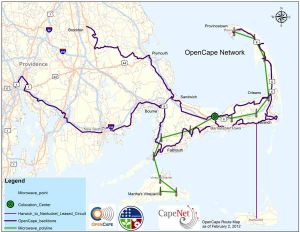Image


 Public safety is important to the region, which is prone to severe weather, and particularly important for outer Cape. OpenCape will improve connectivity by paying for and supporting a backup 700 Mhz network. Redundancy ensures the network can support vital communications in times of emergency.
One of the offshoots of OpenCape is SmarterCape Partnership, an organization with representatives from major public and private entities. SmarterCape provides a place for the public and private silos of the region to collaborate, and to leverage the network and other regional assets. The organizations have a common identity through recognition of their shared problems, which include the Cape’s aging population, outflows of young people, and over-reliance on seasonal businesses and second homes. They know they need diversification to create a year-round economy.
Potential projects are already sprouting. Woods Hole is only one organization that needs greater symmetrical capacity to do its work. Upon hearing of the project, a radiologist who wants to live year-round on the Cape expressed his delight. He can work from anywhere provided he can upload an download large files very quickly to his home computer. Until OpenCape, he had no prospect for leaving the Boston area.
Another example is a Condo association that wants to aggregate its residents’ Internet services by getting a fiber optic connection into the development and using it to provide wireless throughout the complex. Similarly, the University of Massachusetts Dartmouth could use spectrum it owns to provide wireless with fiber backhaul in its neighborhood. There are other opportunities to make services available to lower-income households, perhaps from the community colleges.
Sandwich Economic Initiative Corp. plans to promote the network to businesses that would otherwise consider the community too remote. “Co-offices”, for people who work remotely but would like to work in an office setting, are also a possibility. While they may not add to the tax base in the same way as a new business, they make the work-day community more populous and vibrant.
Gallager says it is important that people understand, “OpenCape is an infrastructure, it’s not a panacea of cures, it’s not the applications that people may use day in and day out.” Using the metaphor of road networks, OpenCape is the main road connecting towns, not a side road connecting residences. Each anchor institution will have different ways of using the network and can learn from the others.
Public safety is important to the region, which is prone to severe weather, and particularly important for outer Cape. OpenCape will improve connectivity by paying for and supporting a backup 700 Mhz network. Redundancy ensures the network can support vital communications in times of emergency.
One of the offshoots of OpenCape is SmarterCape Partnership, an organization with representatives from major public and private entities. SmarterCape provides a place for the public and private silos of the region to collaborate, and to leverage the network and other regional assets. The organizations have a common identity through recognition of their shared problems, which include the Cape’s aging population, outflows of young people, and over-reliance on seasonal businesses and second homes. They know they need diversification to create a year-round economy.
Potential projects are already sprouting. Woods Hole is only one organization that needs greater symmetrical capacity to do its work. Upon hearing of the project, a radiologist who wants to live year-round on the Cape expressed his delight. He can work from anywhere provided he can upload an download large files very quickly to his home computer. Until OpenCape, he had no prospect for leaving the Boston area.
Another example is a Condo association that wants to aggregate its residents’ Internet services by getting a fiber optic connection into the development and using it to provide wireless throughout the complex. Similarly, the University of Massachusetts Dartmouth could use spectrum it owns to provide wireless with fiber backhaul in its neighborhood. There are other opportunities to make services available to lower-income households, perhaps from the community colleges.
Sandwich Economic Initiative Corp. plans to promote the network to businesses that would otherwise consider the community too remote. “Co-offices”, for people who work remotely but would like to work in an office setting, are also a possibility. While they may not add to the tax base in the same way as a new business, they make the work-day community more populous and vibrant.
Gallager says it is important that people understand, “OpenCape is an infrastructure, it’s not a panacea of cures, it’s not the applications that people may use day in and day out.” Using the metaphor of road networks, OpenCape is the main road connecting towns, not a side road connecting residences. Each anchor institution will have different ways of using the network and can learn from the others. 